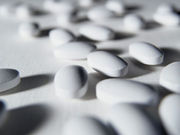Higher clinical cure rate compared with placebo in setting in which MRSA was prevalent
THURSDAY, March 3, 2016 (HealthDay News) — Trimethoprim-sulfamethoxazole results in a higher clinical cure rate of uncomplicated abscesses than placebo, according to a study published in the March 3 issue of the New England Journal of Medicine.
David A. Talan, M.D., from the University of California in Los Angeles, and colleagues conducted a randomized trial at five U.S. emergency departments to compare trimethoprim-sulfamethoxazole with placebo for outpatients aged older than 12 years with an uncomplicated abscess that was being drained. Of the wound cultures, 45.3 percent were positive for methicillin-resistant Staphylococcus aureus (MRSA).
The researchers found that clinical cure of the abscess occurred in 80.5 percent of the trimethoprim-sulfamethoxazole group and in 73.6 percent of the placebo group in the modified intention-to-treat population (P = 0.005). Clinical cure occurred in 92.9 and 85.7 percent of the groups, respectively, in the per-protocol population (P < 0.001). With respect to most secondary outcomes, trimethoprim-sulfamethoxazole was superior to placebo in the per-protocol population, with lower rates of subsequent surgical draining procedures, skin infections at new sites, and infections in household members at seven to 14 days after treatment. Slightly more gastrointestinal side effects were seen for trimethoprim-sulfamethoxazole versus placebo.
“In settings in which MRSA was prevalent, trimethoprim-sulfamethoxazole treatment resulted in a higher cure rate among patients with a drained cutaneous abscess than placebo,” the authors write.
Several authors disclosed financial ties to the pharmaceutical industry.
Full Text (subscription or payment may be required)
Copyright © 2016 HealthDay. All rights reserved.








